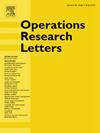更严格的 "布莱克-斯科尔斯隐含波动率统一界限 "及其在寻根中的应用
IF 0.9
4区 管理学
Q4 OPERATIONS RESEARCH & MANAGEMENT SCIENCE
引用次数: 0
摘要
与 Tehranchi(2016)[11]相比,通过系统地使用期权 delta,我们得出了更严格的 Black-Scholes 隐含波动率下限和上限。作为应用,我们提出了一种对数价格的牛顿-拉斐森算法,当使用新下限作为初始猜测时,该算法在所有价格范围内都能快速收敛。我们的新算法是广泛使用的天真牛顿-拉斐森算法的更好替代品,因为天真牛顿-拉斐森算法对于极端期权价格的收敛速度很慢。本文章由计算机程序翻译,如有差异,请以英文原文为准。
Tighter ‘uniform bounds for Black–Scholes implied volatility’ and the applications to root-finding
Using the option delta systematically, we derive tighter lower and upper bounds of the Black–Scholes implied volatility than those in Tehranchi (2016) [11]. As an application, we propose a Newton–Raphson algorithm on the log price that converges rapidly for all price ranges when using a new lower bound as an initial guess. Our new algorithm is a better alternative to the widely used naive Newton–Raphson algorithm, whose convergence is slow for extreme option prices.
求助全文
通过发布文献求助,成功后即可免费获取论文全文。
去求助
来源期刊

Operations Research Letters
管理科学-运筹学与管理科学
CiteScore
2.10
自引率
9.10%
发文量
111
审稿时长
83 days
期刊介绍:
Operations Research Letters is committed to the rapid review and fast publication of short articles on all aspects of operations research and analytics. Apart from a limitation to eight journal pages, quality, originality, relevance and clarity are the only criteria for selecting the papers to be published. ORL covers the broad field of optimization, stochastic models and game theory. Specific areas of interest include networks, routing, location, queueing, scheduling, inventory, reliability, and financial engineering. We wish to explore interfaces with other fields such as life sciences and health care, artificial intelligence and machine learning, energy distribution, and computational social sciences and humanities. Our traditional strength is in methodology, including theory, modelling, algorithms and computational studies. We also welcome novel applications and concise literature reviews.
 求助内容:
求助内容: 应助结果提醒方式:
应助结果提醒方式:


